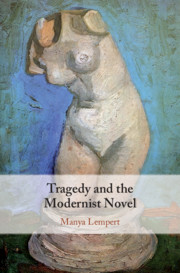Book contents
- Tragedy and the Modernist Novel
- Tragedy and the Modernist Novel
- Copyright page
- Dedication
- Contents
- Acknowledgments
- Chapter 1 Introduction
- Chapter 2 Hardy’s Theory of Tragic Character
- Chapter 3 Woolf and Darwin
- Chapter 4 Camus’s Modernist Forms and the Ethics of Tragedy
- Chapter 5 Beckett
- Notes
- Bibliography
- Index
Chapter 1 - Introduction
Modernist Tragedy
Published online by Cambridge University Press: 20 August 2020
- Tragedy and the Modernist Novel
- Tragedy and the Modernist Novel
- Copyright page
- Dedication
- Contents
- Acknowledgments
- Chapter 1 Introduction
- Chapter 2 Hardy’s Theory of Tragic Character
- Chapter 3 Woolf and Darwin
- Chapter 4 Camus’s Modernist Forms and the Ethics of Tragedy
- Chapter 5 Beckett
- Notes
- Bibliography
- Index
Summary
This introduction explains (1) these authors’ fascination with Greek tragedy, (2) their modern reenvisioning of it in contrast to consolatory philosophies of tragedy and science, (3) their representation instead of a natural world that is a source of terror, and (4) their stand against nihilism in the face of such terror. My contention is that for Hardy, Woolf, Camus, and Beckett, tragedy is not a genre that defends or valorizes pain. Tragedy is a genre of insurrectionary truth-telling. I suggest that their tragic fiction models or incites desire for solidarity in the face of inhuman time scales and the destructiveness and chanciness of natural history. These writers recognize, too, that modern European history acts as (rather than banishes) tragic fatality. Engaging with tragedy, these authors devise strategies to evoke and indict both natural accident and manmade violence.
- Type
- Chapter
- Information
- Tragedy and the Modernist Novel , pp. 1 - 29Publisher: Cambridge University PressPrint publication year: 2020

